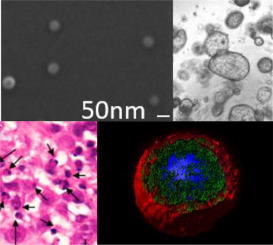当前位置:
X-MOL 学术
›
J. Control. Release
›
论文详情
Our official English website, www.x-mol.net, welcomes your
feedback! (Note: you will need to create a separate account there.)
Nanostructured toxins for the selective destruction of drug-resistant human CXCR4+ colorectal cancer stem cells.
Journal of Controlled Release ( IF 10.5 ) Pub Date : 2020-01-10 , DOI: 10.1016/j.jconrel.2020.01.019 Naroa Serna 1 , Patricia Álamo 2 , Prashanthi Ramesh 3 , Daria Vinokurova 3 , Laura Sánchez-García 1 , Ugutz Unzueta 4 , Alberto Gallardo 4 , María Virtudes Céspedes 4 , Esther Vázquez 1 , Antonio Villaverde 1 , Ramón Mangues 4 , Jan Paul Medema 3
Journal of Controlled Release ( IF 10.5 ) Pub Date : 2020-01-10 , DOI: 10.1016/j.jconrel.2020.01.019 Naroa Serna 1 , Patricia Álamo 2 , Prashanthi Ramesh 3 , Daria Vinokurova 3 , Laura Sánchez-García 1 , Ugutz Unzueta 4 , Alberto Gallardo 4 , María Virtudes Céspedes 4 , Esther Vázquez 1 , Antonio Villaverde 1 , Ramón Mangues 4 , Jan Paul Medema 3
Affiliation

|
Current therapies fail to eradicate colorectal Cancer Stem Cells (CSCs). One of the proposed reasons for this failure is the selection, by chemotherapy exposure, of resistant cells responsible for tumor recurrence. In this regard, CXCR4 overexpression in tumor associates with resistance and poor prognosis in colorectal cancer (CRC) patients. In this study, the effectiveness of engineered CXCR4-targeted self-assembling toxin nanoparticles has been explored in the selective killing of CXCR4+ human colon-CSCs compared to 5-Fluorouracil and Oxaliplatin, both classical CRC chemotherapeutic agents. To assess this, 3D spheroid colon-CSCs cultures directly derived from CRC patients and CRC-CSC spheroid-derived tumor mouse models were developed. In these animal models, nanostructured toxins show highly selective induction of pyroptosis in the absence of apoptosis, thus having a great potential to overcome tumor resistance, since the same tumor models show resistance to chemotherapeutics. Results set the basis for further development of more efficient therapies focused on selective CXCR4+ CSCs elimination activating non-apoptotic mechanisms and represent a pre-clinical proof of concept for the use of CSCs-targeted nanostructured toxins as protein drugs for CRC therapy.
中文翻译:

纳米结构毒素可选择性破坏抗药性人CXCR4 +结直肠癌干细胞。
当前的疗法无法根除结直肠癌干细胞(CSC)。导致这种失败的原因之一是通过化学疗法暴露来选择引起肿瘤复发的耐药细胞。在这方面,肿瘤中CXCR4的过表达与结直肠癌(CRC)患者的耐药性和预后不良有关。在这项研究中,与经典的CRC化疗药物5-氟尿嘧啶和奥沙利铂相比,在选择性杀灭CXCR4 +人结肠CSCs中,已经探索了针对CXCR4靶向的自组装毒素纳米颗粒的功效。为了对此进行评估,开发了直接源自CRC患者的3D球状结肠CSC培养物和CRC-CSC球状肿瘤小鼠模型。在这些动物模型中 纳米结构的毒素在不存在凋亡的情况下表现出高度选择性的诱导凋亡的作用,因此具有克服肿瘤耐药性的巨大潜力,因为相同的肿瘤模型对化学疗法具有耐药性。结果为进一步开发针对选择性CXCR4 + CSC消除激活非凋亡机制的更有效疗法的基础奠定了基础,并代表了将CSCs靶向的纳米结构毒素用作CRC治疗的蛋白药物的临床前概念证明。
更新日期:2020-01-11
中文翻译:

纳米结构毒素可选择性破坏抗药性人CXCR4 +结直肠癌干细胞。
当前的疗法无法根除结直肠癌干细胞(CSC)。导致这种失败的原因之一是通过化学疗法暴露来选择引起肿瘤复发的耐药细胞。在这方面,肿瘤中CXCR4的过表达与结直肠癌(CRC)患者的耐药性和预后不良有关。在这项研究中,与经典的CRC化疗药物5-氟尿嘧啶和奥沙利铂相比,在选择性杀灭CXCR4 +人结肠CSCs中,已经探索了针对CXCR4靶向的自组装毒素纳米颗粒的功效。为了对此进行评估,开发了直接源自CRC患者的3D球状结肠CSC培养物和CRC-CSC球状肿瘤小鼠模型。在这些动物模型中 纳米结构的毒素在不存在凋亡的情况下表现出高度选择性的诱导凋亡的作用,因此具有克服肿瘤耐药性的巨大潜力,因为相同的肿瘤模型对化学疗法具有耐药性。结果为进一步开发针对选择性CXCR4 + CSC消除激活非凋亡机制的更有效疗法的基础奠定了基础,并代表了将CSCs靶向的纳米结构毒素用作CRC治疗的蛋白药物的临床前概念证明。











































 京公网安备 11010802027423号
京公网安备 11010802027423号